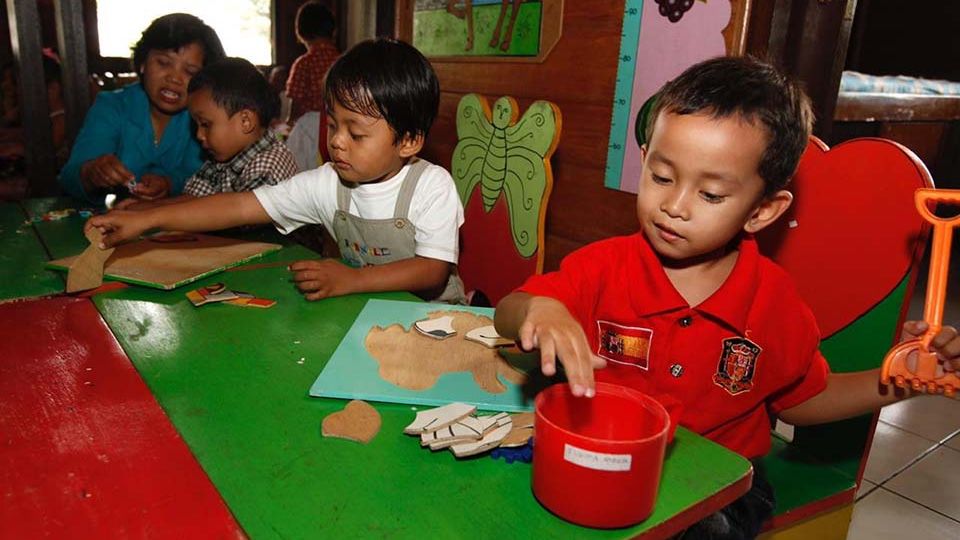July 4, 2024
JAKARTA – The United Nations’ recent report of a learning crisis experienced by low-and-middle income countries globally has raised concerns about the state of early childhood education in Indonesia, which appeared to be lagging its neighboring countries.
The report, conducted by UNICEF in collaboration with UNESCO, underlines the importance of early childhood care and education (ECCE) to promote school readiness and lifelong well-being, among other things.
However, almost 60 percent of children in low-income countries do not have access to early learning opportunities, the report notes. As a result, over 300 million of the world’s children will not reach minimum reading proficiency levels by 2030 unless immediate action is taken.
The UN emphasized that ECCE was the most transformative investment a country can make to give all children a fair start in life and combat inequalities early on.
“Investing in our youngest children brings the greatest returns, both socially and economically […] The price of inaction can be very high, as our work shows,” Stefania Giannini of UNESCO said during the report’s launch on June 17, as stated in an official statement.
Read also: Engagement of minor in Madura renews call to end child marriage
The report also found that around 43 percent of pre-primary teachers across the globe do not have the necessary training, estimating that the world would need six million more pre-primary teachers by 2030 to meet the Sustainable Development Goal (SDG) target to ensure quality early education for all children.
In addition, the report said that ECCE in most countries is severely underfunded. Globally, an additional US$21 billion is needed to fill the financing gap to ensure that children from all member states can get access to one year’s worth of free pre-primary schooling.
The report listed nine recommendations to help countries get back on track in its early childhood education goals, including for countries to allocate 10 percent of their education budget to ECCE.
Aside from just throwing money at the problem, governments are also urged to roll out more holistic policies around ECCE, such as parental support programs as well as recruiting and training pre-primary schoolteachers.
Early childhood education in Indonesia
Data from Statistics Indonesia (BPS) showed that only a measly 36.36 percent of children across the country attended pre-primary schools last year, although the participation figure is still a slight increase from 35.28 percent in 2022.
This puts Indonesia far behind the regional average, as UNICEF data suggests that in East and Southeast Asia in 2022, an average of 80 percent of children were enrolled in pre-primary schools one year before the official primary school age.
Read also: Parents, observers decry perennial problems with school zoning policy
Nonetheless, President Joko “Jokowi” Widodo’s administration has in recent years put more effort into developing the ECCE sector, as the country hosted the Southeast Asia Policy Dialogue on ECCE in July last year to coincide with Indonesia’s ASEAN chairmanship.
The dialogue ended with a leaders’ declaration where member states agreed to develop affordable, accessible and high-quality ECCE while also progressively allocating bigger percentages of a country’s education expenditure to the sector.
Making it mandatory
Center for Education and Policy Studies (PSPK) executive director Nisa Felicia told The Jakarta Post on Monday that the Indonesian government is still too reliant on the private sector to operate ECCE, as only around four percent of pre-primary schools are state-owned, according to a PSPK report in January this year.
This has made tuition more expensive, which subsequently exacerbates the difference in enrollment rates between children from wealthier and poorer families.
Such a condition is reflected in the UN’s report; only 55 percent of children aged between 36 to 59 months growing up in the poorest households are developmentally on track, compared to 78 percent of children in the richest households.
Read also: Tackling learning poverty in a nation battling real poverty
Nisa further disclosed a big discrepancy in quality among pre-primary schools throughout the country. Around half of pre-primary schools are not accredited, and less than five percent of them receive the best accreditation.
“The poor quality in pre-primary schools means that [our education system] has failed to prepare children to study in primary school, and so their ability to learn at the subsequent levels [of schooling] will also be adversely impacted,” Nisa said.
She urged the government to increase the country’s mandatory schooling period to 13 years in order to include early childhood education. “If there is a law [making early childhood education compulsory], the government will have to be more serious in providing more access to high-quality pre-primary schools”.
The government had previously sought to extend the mandatory schooling period to 13 years through the omnibus education bill. But the legislation was scrapped in September 2022 after failing to garner enough support in the House of Representatives.


